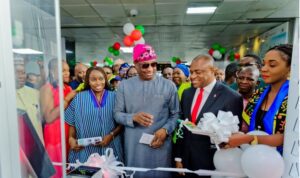LCCI tasks governments on improved Foreign Direct Investment
The Lagos Chamber of Commerce and Industry (LCCI) has advised governments to shore up efforts at repositioning Nigeria as a global and prime investment destination.
The President of LCCI, Mrs Toki Mabogunje, gave the advice on Tuesday at the 2021 virtual Lagos International Investment Conference with the theme: “Repositioning Nigeria as a Key Global Investment Destination.”
Mabogunje said that international investment inflows into Nigeria had declined in the past few years.
She attributed the decline to economic headwinds the country had faced including insecurity, foreign exchange crisis and inflation.
The LCCI president called on the Presidential Enabling Business Environment Council (PEBEC) to consistently work with relevant private and public sector institutions to keep tab on the indicators that measured the ease of doing business ranking.
“While the World Bank may have discontinued the publication of the Ease of Doing Business Ranking, the indicators remain a solid measure of economic freedom and critical factors to consider in attracting foreign investors.
“The Federal Ministry of Industry, Trade and Investment, Nigerian Investment Promotion Commission, and PEBEC should continually pay attention to starting a business, dealing with construction permits, getting electricity and resolving insolvency, among others.
“There are various investment opportunities in the Nigerian non-oil sector, and, at present, the African Continental Free Trade Agreement (AfCFTA) is the key driver of FDI inflows into Africa in general and Nigeria in particular.
“There is the need to speed up implementation of the Petroleum Industry Act, 2021, to create an enabling environment that attracts foreign investors to the oil and gas sector,” she said.
She said the chamber had always advocated a fully-deregulated downstream sector of the oil and gas industry and creation of a level playing ground where market forces would be allowed to allocate resources through cost-reflective pricing.
“We, however, urge the government to engage with all relevant stakeholders and players in the sector to arrive at an inclusive deregulation policy that creates a competitive business environment where all investors can thrive.
“The Act should be implemented with a focus on the areas of business regulations that make up the indicators of the Ease of Doing Business Ranking by the World Bank,” she said.
Mabogunje urged governments to establish industrial clusters and Special Economic Zones (SEZs) where robust infrastructure would be provided to support manufacturing and lower taxes applied.
She said that such a situation would lower production cost and make Nigeria-produced goods more competitive in the international market.
On the closure of land borders, Mabogunje said the LCCI shared the concern of the Federal Government on security and smuggling; it believed that the closure of land borders inhibited trade and could scare foreign investors.
“We are excited about the signing of the AFCFTA, but we need to get ourselves ready for the pressure of competition inherent in the continental economic integration agenda.
“Several commitments were made about the creation of an environment that would enable the private sector to be competition-ready, but not much has happened in this regard so far.
“We are aware of the efforts of the government to fix our infrastructure, including roads and railways, but funding has remained a major challenge.
“We would like to see a new funding model with a much bigger focus on private sector capital within a Public-Private Partnership (PPP) framework for infrastructure development in the country,” she said.
Responding, Mrs Mariam Katagum, Minister of State for Industry, Trade and Investment, said the Nigerian Government was committed to delivering the right policies and incentives to make the climate right for investments.
Katagum, represented by Mrs Kemi Akorodudu, Director, a director with the ministry, said to this end, a business startup policy was being developed to enhance business startups in Nigeria and improve Nigeria’s production capacity.
She added that a Nigerian investment policy to shore up investor’s confidence was also in the pipeline.
“Nigeria is aggressively focused on diversification and building a more robust non-oil economy.
“This we believe can be achieved via a number of ways inclusive of driving financial investment into real sector, among others, with the private sector on the driver’s seat of the economy.
“Government is also focused on an agriculture-led investment, creating industrial pacts and MSME development with enhanced access to market, reduced cost of production and others.
“Nigeria is also looking at facilitating reinvestment and providing balanced investors rights with improved investment climate,” she said.




